If you’ve ever visited a Tibetan Buddhist temple, you may have noticed a set of eight auspicious symbols displayed prominently in walls and on the floors. These Buddha signs are known as the Ashtamangala.
In Tibetan Buddhism, these eight symbols represent some of the most important aspects of Buddhist teaching. They are often used in artwork, ritual items, and architecture to represent these concepts.
In this guide, we’ll take a closer look at each of the eight Buddhism symbols and what they represent. We’ll also discuss some of the ways you can use these signs in your own life to create positive energy and good fortune.
What are the Eight Buddhist Symbols?
The eight Buddhists treasures that are considered auspicious are:
- The Precious Parasol
- The White Conch Shell
- The Two Golden Fish
- The Eternal Knot
- The Treasure Vase
- The Victory Banner
- The Lotus Flower
- The Dharma Wheel
What Do the Eight Auspicious Symbols Mean?
The Ashtamangala are a set of eight auspicious symbols that have been used in Buddhist traditions for centuries. They represent some of the most important aspects of Tibetan Buddhist teaching, including wisdom, compassion, and fearlessness.
Below, we’ll take a closer look at each of the eight symbols and what they represent:
Symbol #01: The Precious Parasol
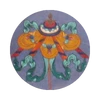
The precious parasol is a symbol of protection. It represents the Buddha’s compassion for all beings, and his ability to shelter us from the harmful effects of our own actions.
Symbol #02: The White Conch Shell
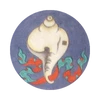
The white conch shell is a symbol of Buddha’s famed teaching. It represents the fact that Buddhist teaching can be heard from far away, just like the sound of a conch shell.
Symbol #03: The Two Golden Fish

The two golden fish are a symbol of fearlessness. In Tibetan Buddhism, the sea is often seen as a place of danger. The two fish represent our ability to swim through the dangerous sea without fear.
Symbol #04: The Eternal Knot

The eternal knot is a symbol of the Buddha’s infinite wisdom and compassion. It represents the fact that his teachings are eternal and will never be forgotten.
Symbol #05: The Treasure Vase
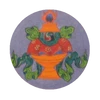
The treasure vase is a symbol of the Buddha’s buddha-nature, which is like a bottomless well of compassion and love. It’s also a Buddhist good luck symbol for abundance.
Symbol #06: The Victory Banner
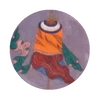
The victory banner is a symbol of the Buddha’s triumph over ignorance and hatred. It represents his ability to lead us to enlightenment, even in the face of great adversity.
Symbol #07: The Lotus Flower
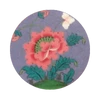
The lotus flower is a symbol of purity. Just like how the lotus blooms in murky waters, the flower represents the Buddha’s perfect and untainted nature.
Symbol #08: The Dharma Wheel

The Dharma wheel is a symbol of the Eightfold Path of Buddhism. It represents the Buddha’s teachings on how to live a moral and ethical life so you can be freed from human suffering.
How to Use the Eight Auspicious Symbols in Your Life
There are many ways you can use the Ashtamangala in your own life. Here are a few ideas:
- Display the symbols in your home or office to create a positive and auspicious environment.
- Use them as a focus for meditation and visualization practices.
- Wear them as jewelry or carry them as talismans.
- Give them as gifts to loved ones.
Wrapping Up
The Ashtamangala are a powerful reminder of the Buddha’s teachings and his path to enlightenment. By using these Buddhism symbols in our own lives, we can create positive energy and good fortune for ourselves and others.
If you wish to attract good fortune, consider using the eight auspicious symbols of Tibetan Buddhism now. May they bring you wisdom, compassion, and all the abundance you desire!
Photo by Redtigerxyz / CC by 3.0
